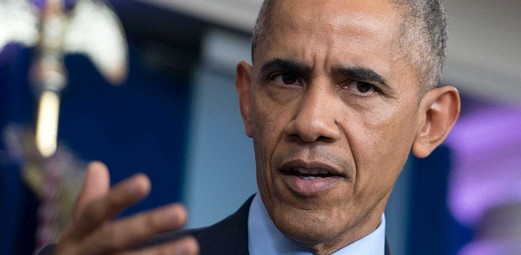Judicial Watch: Smoking-Gun Documents Prove Obama IRS Targeting Worse Than We Thought
Reports that the Obama administration “weaponized” federal agencies against political opponents keep coming. In new “smoking-gun” documents obtained via FOIA lawsuit against the Internal Revenue Service (IRS), Judicial Watch has uncovered evidence that the targeting of conservative groups by the Obama IRS was even more expansive than we knew.
On Tuesday, Judicial Watch released 695 pages of new documents showing IRS officials admitting the agency used “inappropriate political labels” to screen conservative organizations, as well as evidence the IRS offered “expedited consideration” to 501(c)(4) tax-exempt organizations if they agreed “to restrict their alleged political activities” — a tactic Katie Pavlich aptly describes as “bribery” that served to silence the administration’s opponents.
Judicial Watch filed the FOIA lawsuit after the IRS revealed it had located thousands of documents that potentially related to audits of Tea Party and other 501(c)(4) organizations. Hundreds of the documents, Judicial Watch says, were previously “withheld” by the Obama administration from congressional review:
Of the 695 pages of documents released by the IRS, 422 (61%) were withheld in their entirety. These newly identified records are not records that were contained in the “Congressional Database,” which the IRS created in 2013 to house records responsive to congressional inquiries into the IRS scandal.
After examining the 695 documents, Judicial Watch President Tom Fitton said it seems clear why the Obama IRS was reluctant to reveal them. “No wonder the Obama IRS has been hiding these records,” said Fitton. “The new smoking-gun documents contain admissions by the Obama IRS that it inappropriately targeted conservative groups. But the records also show that the abuse continued – as the Obama IRS tried to force conservative applicants to give up their First Amendment rights in order to finally get their applications granted.”

Several key documents were created shortly after a May 14, 2022 Inspector General report exposing the agency’s singling out of nonprofit groups with certain conservative keywords in their names and descriptions, including “Tea Party” and “Patriot,” among others.
“Early in Calendar Year 2010, the IRS began using inappropriate criteria to identify organizations applying for tax-exempt status (e.g., lists of past and future donors),” the IG report explained. The Obama IRS also “delayed processing of targeted groups’ applications” ahead of the 2012 election, the report concluded.
Judicial Watch provides some key highlights from the newly released documents, including a June 20, 2013, memo from Karen Schiller, then-Acting Director, EO Rulings and Agreement, who ordered that the “Be on the Lookout” (BOLO) and “Touch and Go” (TAG) labels applied to some organizations should be discontinued until “a more formal process for identification, approval and distribution of this type of data is established.” A little over a month later, Schiller admitted that the agency had been applying “inappropriate political labels” to groups. Here’s an excerpt from Schiller’s August 9, 2013 memo:
As Acting Commissioner Danny Werfel has said, the IRS has taken decisive action to eliminate the use of inappropriate political labels in the screening of 501(c)(4) applications. IRS policy is now clear that screening is based on activity, not words in a name. The new steps and current policies were outlined in the June 24 report, which noted: “In the absence of BOLO lists, the Determinations Unit will continue to screen for information affecting the determination of applications for tax exempt status, including activity tied to political campaign intervention, but it [will] be done without regard to specific labels of any kind.” The 30-day report also reflects the June 20, 2022 memorandum, which was issued to officially suspend the use of the BOLO list in the screening process.
Schiller’s memos were echoed by a September 30, 2021 memo from EO Acting Director Kenneth C. Corbin underscoring that “words and labels” should not be used to determine an organization’s status.
Judicial Watch also provided a document citing the “optional process” that a 501(c)(4) could undergo in order to enjoy an “expedited” review process. That “optional process” required the nonprofit to limit political activity. Below is an excerpt from the “Dear [Applicant]” letter:
This optional expedited process is currently available only to applicants for 501(c)(4) status with applications pending for more than 120 days as of May 28, 2013, that indicate the organization may be involved in political campaign intervention.
In this optional process, an organization will represent that it satisfies, and will continue to satisfy, set percentages with respect to the level of its social welfare activities and political campaign intervention activities (as defined in the specific instructions on pages 5-7). These percentage representations are not an interpretation of law but are a safe harbor for those organizations that choose to participate in the optional process.





